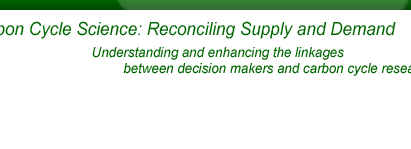|
|
|
|
Carbon Cycle and Carbon Sequestration Supply Side Links
- U.S. Global Change Research Program. [PC1] (USGCRP)
The US Global Change Research Program “integrates research carried out under the auspices of a number of Agencies of the U.S. Federal Government.” [PC2] The links below describe the specific research programs and contain [PC3] additional links relevant to activities in each department. Each department places a different emphasis on C cycle research, however, but all of the USGCRP’s partners are listed below for convenience.
- Department of Agriculture
- Department of Commerce, National Oceanic & Atmospheric Administration
- Department of Defense
- Department of Energy
- Department of Health and Human Services, National Institutes of Health
- Department of the Interior, U.S. Geologic Survey
- Department of State [PC10]
- Environmental Protection Agency
- National Aeronautics & Space Administration
- National Science Foundation
- Department of Transportation, Center for Climate Change and Environmental Forecasting
- Smithsonian Institution
- U.N. Framework Convention on Climate Change supplies useful information through the International Panel on Climate Change (IPCC) and also uses scientific information, especially with regard to issues relating to the Kyoto Protocol.
- U.S. Climate Change Technology Program: a multi-agency research and development program for the development of climate change technology. Follow links to ‘Capturing and Sequestering Carbon Dioxide’ and ‘Technology Options for the Near and Long Term’ which has a section dedicated to sequestration technologies.
- Carbon Dioxide Information Analysis Center (CDIAC). CDIAC, which includes the World Data Center for Atmospheric Trace Gases, is “the primary global-change data and information analysis center of the U.S. Department of Energy…CDIAC responds to data and information requests from users from all over the world who are concerned with the greenhouse effect and global climate change.” CDIAC also contains a glossary of terms, conversions and pages for understanding carbon accounting.
- U.S. Climate Change Science Program serves to integrate federal research on global change and climate change. Be sure to look at the Overview of U.S. Research on Climate and Global Change, and in particular, information about the New Management Approach to Improve Accountability and the Flow of Scientific Information to Policymakers.
- U.S. Department of Agriculture, Agricultural Research Service Action Plan Component I: Carbon Cycle and Carbon Storage. The site describes the current research related to the carbon cycle and sequestration. Their mission is to conduct and transfer the results of research to identify the best practices for storing carbon from atmospheric carbon dioxide in natural soil and plant systems to reduce greenhouse gases and enhance soil resources. The Homepage for the Agricultural Research Service is also a useful place to look.
- U.S. Department of Energy Office of Science: Carbon Sequestration. Provides a general overview to C sequestration and links to specific research projects.
- U.S. Department of Energy Office of Fossil Energy: Carbon Sequestration Regional Partnerships [PC15] . The goal of the partnerships, created in 2002, is to create a national network of public-private sector partnerships that would determine the most suitable technologies, regulations, and infrastructure needs for carbon capture, storage and sequestration in different areas of the country. The page contains links to each of the seven regional partnerships.
- The National Science Foundation lists all of its Global Change Research Programs at this website. The site lists research by topics, areas and subjects and is easily navigable.
- General Information on the sequestration of carbon in Oceans can be found at the following sites: Research Links and Background on Ocean Carbon Sequestration provided by the Lawrence Berkeley Lab. The site also provides links to other labs. The Monterey Bay Aquarium Research Institute supports a site which describes its Direct Experiments on the Ocean Disposal of Fossil Fuel CO2.
- MIT Laboratory for Energy & the Environment’s Carbon Sequestration Initiative. Contains a useful White Paper titled ‘CO2 Capture, Reuse and Storage Technologies for Mitigating Global Climate Change’
- AmeriFlux is a useful site that collects, synthesizes and disseminates “long-term measurements of CO2, water, and energy exchange from a variety of ecosystems; enable improved predictions of future concentrations of atmospheric CO2” and enhance our understanding of carbon sequestration, among other objectives. AmeriFlux’s objective is to share data and the Science Plan.
|
|
|
|




